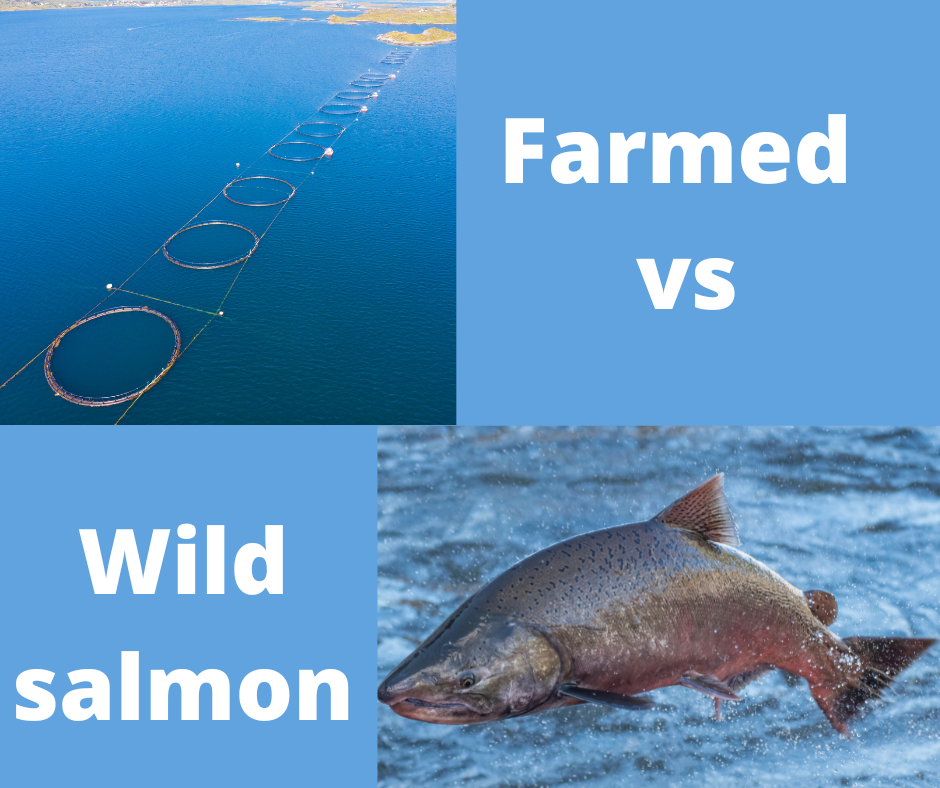Which do you choose?
Have you ever even thought about it ?
The main benefit of eating salmon, apart from the protein, is the Omega 3’s contained in it.
Most of us just don’t get enough Omega 3’s and they’re necessary for heart, brain and eye health.
Without getting too ‘sciencey’, there are 3 types of omega 3 fatty acids, some fatty acids are found in plant foods like flax, hemp, chia seeds & walnuts. However, the bodies conversion of Omega 3’s from these food sources is low, so in order to get enough Omega 3’s, it’s important to include fatty fish, like salmon in your healthy eating.
Salmon is widely available, has a healthy reputation and so is a popular choice for many.
But the cheaper cuts are often farmed.
Farmed vs wild salmon
Both are excellent sources of Omega 3’s, farmed salmon is raised in farms for us to eat, whereas wild is caught in open water. Surprisingly though, farmed salmon is higher in Omega 3’s than wild.
Farmed salmon is higher in fat as they’re normally fed more grains, algae & fishmeal & interestingly the skin is where most of the Omega 3’s are.
Chefs often prefer to cook with farmed salmon due to its higher fat content.
You could think of it in terms of choosing between chicken breast & dark meat; wild salmon is much leaner (like chicken breast), whilst farmed salmon has more fat & holds flavors better (like dark meat).
Nutrient wise farmed salmon is higher in folate & vitamin A, but wild salmon is higher in potassium & selenium.
Both farmed & wild salmon also contain Omega 6’s, which the body can’t produce and together with Omega 3’s are crucial for brain function, normal health & development, as well as help skin & hair growth, maintain bone health, regulate metabolism & maintain the reproductive system.
Typically people eat alot more Omega 6’s in their diet than needed & are low on Omega 3’s, eating more Omega 3’s can help to balance this out.
Downside of eating farmed salmon
One of the main differences in eating farmed salmon is the risk of ingesting higher levels of persisitant organic pollutants (POPs).
Some studies have shown that farm raised salmon can be higher in contaminants due to the environments they are farmed in, rather than open waters. Farm raised fish tend to have a higher instance of disease due to farming conditions.
That doesn’ t mean that eating wild salmon is without risk, as they can still contain contaminants & heavy metals, although the levels are thought to be a lot lower than farmed salmon (2004 study found that contaminants in farm raised salmon were 8 times higher than the concentrations in wild salmon).
This information doesn’t mean you should just ditch eating salmon though, as most people don’t eat nearly enough fish – only one in 5 adults eat enough.
It’s all down to weighing up the risk vs healthy benefits & having a balance.
Want more information to help you decide ?Look out for part 2 ‘ Do the benefits of farmed salmon outweigh the risks?’
Claire x
